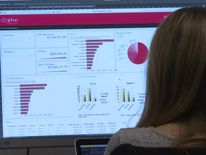
The second-floor office is Donald Trump's digital war room.
Cambridge Analytica is a political tech company that is delivering hypertargeted - and hyperpersuasive - messages to people on social media.
Working for the Trump campaign, Cambridge Analytica crunches billions of data points - from social media, credit card histories, supermarket loyalty schemes, TV watching habits - to tailor political adverts.
It previously worked for the Ted Cruz campaign, as well as Nato and the Ministry of Defence.

Chief executive Alexander Nix told Sky News: "Today in the United States we have somewhere close to four or five thousand data points on every individual.
"The traditional model where 50 million people receive the same blanket advert is being replaced by extremely individualistic targeting.
"So we're able to identify clusters of people who care about a particular issue, pro-life or gun rights, and to then create an advert on that issue, and we can nuance the messaging of that advert according to how people see the world, according to their personalities."
Cambridge Analytica's method relies on machine learning. It starts with a detailed survey, often presented as a psychological test.
The tech company creates these and seeds them on Facebook, where they are filled in by hundreds of thousands of people.
Those answers are combined with data, bought or licensed from brokers and sourced from social media, to create models of their personality. Those models are then applied at a population-level scale.

Mr Nix said: "Each one of these data points on its own is not that revealing, but the sum of them begins to paint a fairly comprehensive picture.
"So we model the personality of every adult across the United States, some 230 million people."
The technology then identifies key voter types, who receive tailored messages - including Facebook and banner adverts.
Unlike traditional media, hypertargeted online and social messaging is not well regulated. Some researchers are concerned about privacy issues, as well as the effect of highly individualised messages on political discourse.
Carl Miller, research director of the Centre for the Analysis of Social Media, told Sky News: "The technology gets better every day, the amount of data about people gets bigger every day.
"And yet public awareness of all of this is not moving very fast at all. The technologies might as well be magic to most of us, given how much we know about them.
"There's a big issue here, that data science is flashing forwards and public acceptability of it - and even knowledge - isn't catching up."
However, Mr Nix said Cambridge Analytica does not believe its methods are "intrusive".
He said: "The data we're using is freely available to license or purchase, and most of this data has had the agreement of the users to be licensed or sold."


No comments:
Post a Comment